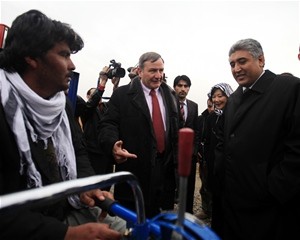
U.S. Ambassador Karl W. Eikenberry and Minister of Agriculture, Irrigation and Livestock Mohammad Asif Rahimi meet with a farmer who is purchasing a two-wheel tractor with implements at an inauguration ceremony in Kabul.
IRD/AVIPA Plus/USAID
USAID teams up with Ministry of Agriculture to bring mechanization to Afghan farmers
3 AUGUST 2011 | KABUL, AFGHANISTAN
On a snowy day in Kabul, 40 area farmers gather at the Badam Bagh demonstration farm. For most of them it marks a transition from centuries-old animal-drawn farming to 21st century mechanization. They’re here to purchase two-wheel tractors and implements subsidized by USAID.
Working in partnership with the Afghan Ministry of Agriculture, Irrigation and Livestock, USAID provides small two-wheel tractors and a variety of farm implements for medium-landholding farmers in 18 provinces of Afghanistan.
U.S. Ambassador Karl W. Eikenberry and Minister of Agriculture Mohammad Asif Rahimi inaugurated the event, underscoring the partnership between the U.S. and Afghanistan in bringing modern farming technology to Afghan farmers. “Today, we are marking a significant day for a group of farmers who represent mid-level farmers around the country,” Ambassador Eikenberry said. “Today, these farmers are investing in the future.”
One of those farmers is Merwais Momand from Danishmand village. In addition to his almond, peach, apple and apricot orchards, he owns a sizeable plot of farmland, which he now hopes to plant in wheat. Momand learned about the mechanization program from his district governor, who invited him to attend a demonstration. In previous decades he and his family farmed with oxen and donkeys. His family has wanted to mechanize their farm for years, but the expense was beyond their means.
“We could never have purchased a two-wheel tractor package without the subsidy,” he said. “These tractors are great. And it’s a popular model, so spare parts are cheap and easy to find.”
Participating farmers, like Momand, are required to make a copayment of $1,400, about a third of the retail value of the package which includes a two-wheel tractor, seed drill, roto-cultivator, reaper, and trailer. If any of the equipment breaks down, the project has trained 250 mechanics in the repair and maintenance of the tractors and attachments.
Mechanization means greater prosperity for Afghan farmers and greater food security for the Afghan people. For many traditional Afghan farmers, mechanization can be a difficult financial leap. But with subsidies by USAID, farmers like Momand are making the transition.







Comment
Make a general inquiry or suggest an improvement.